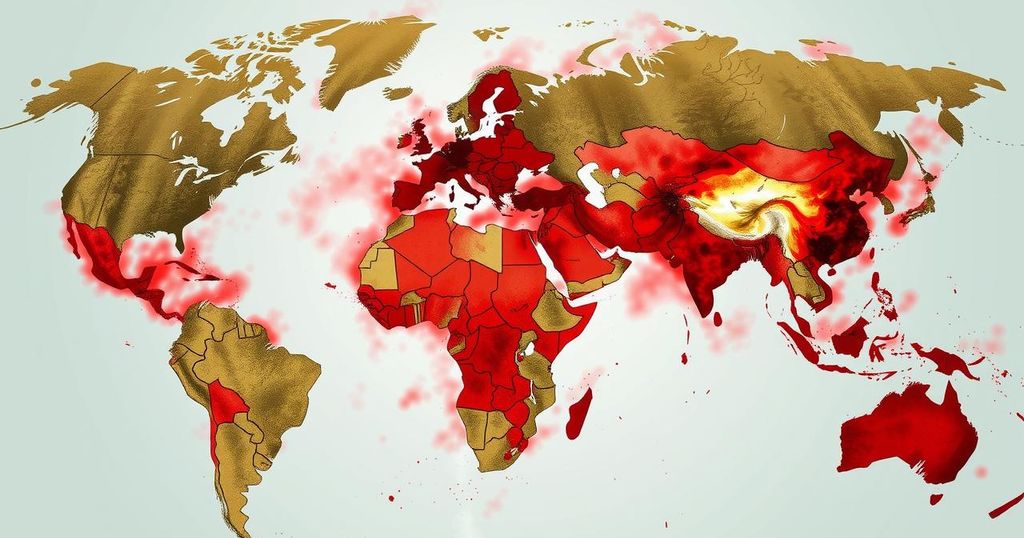The report highlights ongoing humanitarian crises in Sudan, Myanmar, and the Democratic Republic of the Congo. In Sudan, intensified military action has resulted in civilian deaths and a worsening food insecurity crisis. Myanmar continues to face violence post-coup, particularly against ethnic groups. In the DRC, violence driven by armed groups threatens civilian lives and necessitates international oversight. Calls for ceasefires and protective measures are emphasized across these contexts.
The war in Sudan, now advancing into its 20th month, is inflicting severe suffering on the civilian populace and exacerbating a dire humanitarian crisis. In recent months, the Sudanese Armed Forces (SAF) have intensified their military operations against the Rapid Support Forces (RSF), leading to civilian casualties from airstrikes in late December and early January. Darfur is particularly affected, with reports indicating that at least 782 civilians have been killed since May 2024, affected by targeted violence. Additionally, the United States has classified these actions as genocide against certain ethnic groups in Darfur.
Approximately 24.6 million individuals in Sudan face acute food insecurity, with famine conditions declared in several areas, exacerbating by ongoing violence and instability. United Nations officials have condemned the escalating violence and widespread disregard for international humanitarian law, calling for urgent action to safeguard civilians. A unified international response is critical to ensure humanitarian assistance is delivered and to promote a nationwide ceasefire among the conflict parties.
In Myanmar, conflict between the military junta and ethnic resistance organizations continues without resolution. The junta’s recent census, deemed controversial, reflects ongoing territorial losses and failed grievances from prior censuses. Civilians are subjected to significant human rights abuses, including violence and deprivation of aid, particularly in Rakhine State where famine is projected.
Despite resistance forces gaining ground, some groups express willingness to engage in political discussions, emphasizing the need for a dialogue centered on justice, accountability, and self-determination for all communities. The international community is urged to maintain pressure against recognizing the junta’s legitimacy amid severe abuses of human rights.
Regarding the Democratic Republic of the Congo (DRC), the UN Security Council renewed the mandate for MONUSCO, acknowledging the intensified violence from armed groups like M23 and ADF. The escalation is tied to competition over valuable resources in the eastern region, necessitating strong governance and ethical supply chain management. Corporate accountability in sourcing conflict minerals is increasingly scrutinized, as certain companies face allegations of benefiting from human rights abuses. This context highlights the importance of MONUSCO’s presence and a comprehensive approach to resolving the ongoing violence.
The ongoing conflicts in Sudan, Myanmar, and the Democratic Republic of the Congo exemplify severe humanitarian crises characterized by violence against civilians, food insecurity, and international legal violations. In Sudan, the civil war is leading to significant casualties and displacement, particularly evident in Darfur. Myanmar confronts challenges connected to military governance and ethnic discrimination, particularly against the Rohingya. Meanwhile, in the DRC, continued skirmishes involving multiple armed groups illustrate the complex interplay of local resource management, human rights abuses, and international corporate responsibility. These nations collectively demonstrate the urgent need for international intervention to alleviate suffering, enforce humanitarian laws, and promote peace and governance reforms. The response from global entities, including the United Nations and humanitarian organizations, is crucial in addressing these crises effectively.
In conclusion, the situations in Sudan, Myanmar, and the Democratic Republic of the Congo underscore critical human rights violations and humanitarian crises that require immediate and sustained international attention. The calls for ceasefire, protection of civilians, and adherence to international laws are paramount. Additionally, fostering political dialogues aimed at justice and accountability can contribute to long-term stability and peace in these regions. Collaborative efforts among global stakeholders are essential in mitigating ongoing conflicts and addressing the root causes of these crises.
Original Source: www.globalr2p.org






